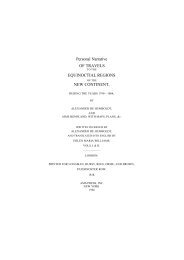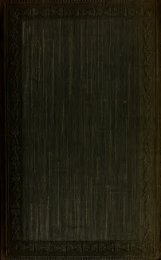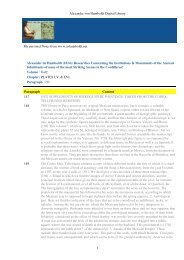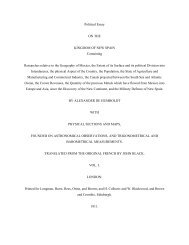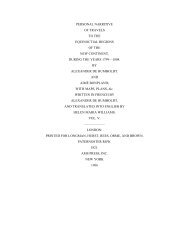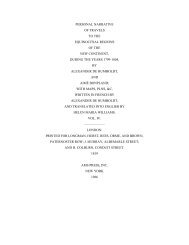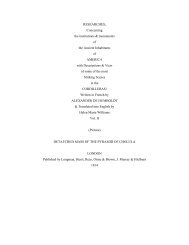See the complete document here
See the complete document here
See the complete document here
Create successful ePaper yourself
Turn your PDF publications into a flip-book with our unique Google optimized e-Paper software.
St> COSMOS.<br />
scribe batt](3-fields, <strong>the</strong> crossing of rivers or difficult mouutaiu<br />
passes in <strong>the</strong>ir narrations of <strong>the</strong> struggle of man against natural<br />
obstacles. In <strong>the</strong> Annals of Tacitus, I am charmed with<br />
<strong>the</strong> description of <strong>the</strong> untov/ard passage of Germanicus over<br />
<strong>the</strong> Amisia, and <strong>the</strong> grand geographical delineation of <strong>the</strong><br />
mountain chains of Syria and Palestine.* Curtius has left<br />
us a fine natural picture of a woody desert to <strong>the</strong> west of Hec-<br />
atompylos, through which <strong>the</strong> Macedonian army had to pass<br />
in <strong>the</strong> marshy region of Mazanderan.f I would refer more<br />
circumstantially to this passage if our uncertainty as to <strong>the</strong><br />
age in which this writer lived did not prevent our deciding<br />
what was due to <strong>the</strong> poet's own imagination and what was<br />
derived from historic sources.<br />
The great encyclopedic work of <strong>the</strong> elder Pliny, which, b^<br />
<strong>the</strong> richness of its contents, surpasses any o<strong>the</strong>r production of<br />
antiquity, will be more fully considered in <strong>the</strong> sequel, when<br />
we enter on <strong>the</strong> " history of <strong>the</strong> contemplation of <strong>the</strong> uni-<br />
verse." The natural history of Pliny, which has exercised a<br />
powerful influence on <strong>the</strong> Middle Ages, is, as his nephew, <strong>the</strong><br />
younger Pliny, has elegantly remarked, " manifold as nature<br />
itself" As <strong>the</strong> creation of an irresistible passion for a comprehensive,<br />
but often indiscriminate and irregular accumulation<br />
of facts, this work is unequal in style, being sometimes<br />
simple and narrative, and sometimes full of thought, anima-<br />
tion, and rhetorical ornament, and from its very character deficient<br />
in individual delineations of nature; although, w<strong>here</strong>ver<br />
<strong>the</strong> connection existing betv/een <strong>the</strong> active forces of <strong>the</strong><br />
universe, <strong>the</strong> well-ordered Cosmos {iiaturcR onajestas), is made<br />
* Tac, An7i., ii., 23-24; Hist., v., 6. The only fragment preserved<br />
by <strong>the</strong> rhetorician Seneca {Suasor., i., p. 11, Bipont) that we possess<br />
o\ a heroic poem, in which Ovid's friend Pedo Albinovanus describes<br />
<strong>the</strong> deeds of Germanicus, likewise describes <strong>the</strong> unfortunate passage of<br />
<strong>the</strong> Ems (Ped. Albinov., Elegies, Amst., 1703, p. 172). Seneca considers<br />
this description of <strong>the</strong> stormy waters as more picturesque than<br />
any passage to be found in <strong>the</strong> writings of <strong>the</strong> o<strong>the</strong>r Roman poets.<br />
remarks, however, Latini declamatores iii Oceani descriptione non nimu<br />
viguerunt; nam aut tumide scripserunt aut curiose.<br />
t Curt., in Alex. Magno., vi., 16. Compare Droysen, Gesck. Alexanders<br />
des Grossen, 1833, s. 2G.5. In Quasi. Natur., lib. iii., c. 27-30,<br />
p. 677-686, ed. Lips., 1741, of <strong>the</strong> too rhetorical Lucius Annaeus Seneca,<br />
<strong>the</strong>re is a remarkable description of one of <strong>the</strong> several instances of<br />
<strong>the</strong> destruction of an originally pure and subsequently sinful race, bj<br />
an almost universal deluge, commencing with <strong>the</strong> words Cum fatalit<br />
dies diluvii venerit; and terminating thus: peracto cxitio generis hnma<br />
ni extinciisqne pariter feris in quarum homines ingenia transierant<br />
<strong>See</strong>, also, <strong>the</strong> description of chaotic terrestrial revolutions, in Bhagaz>a<br />
ta- Purana. bk. iii., c. 17 (eJ. Burnouf, t. i., p. 44^.<br />
He




